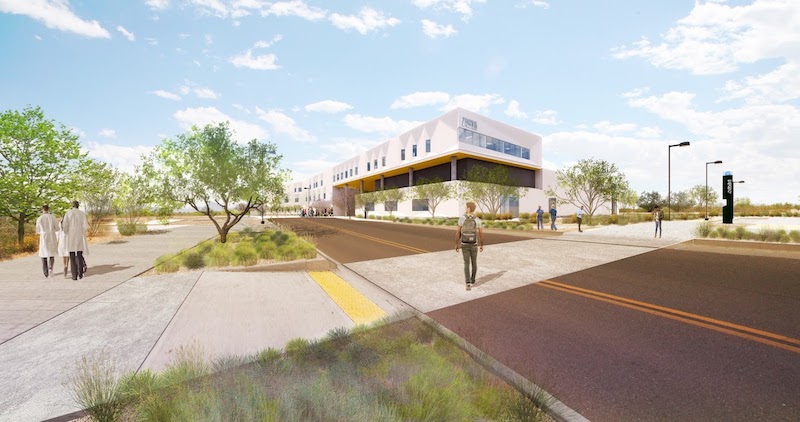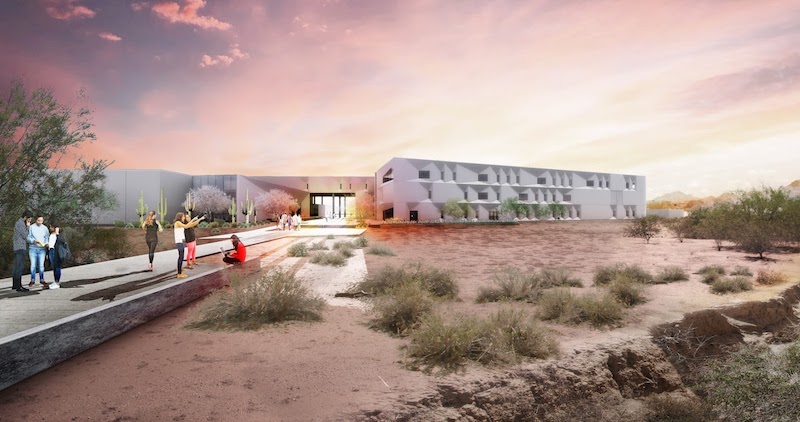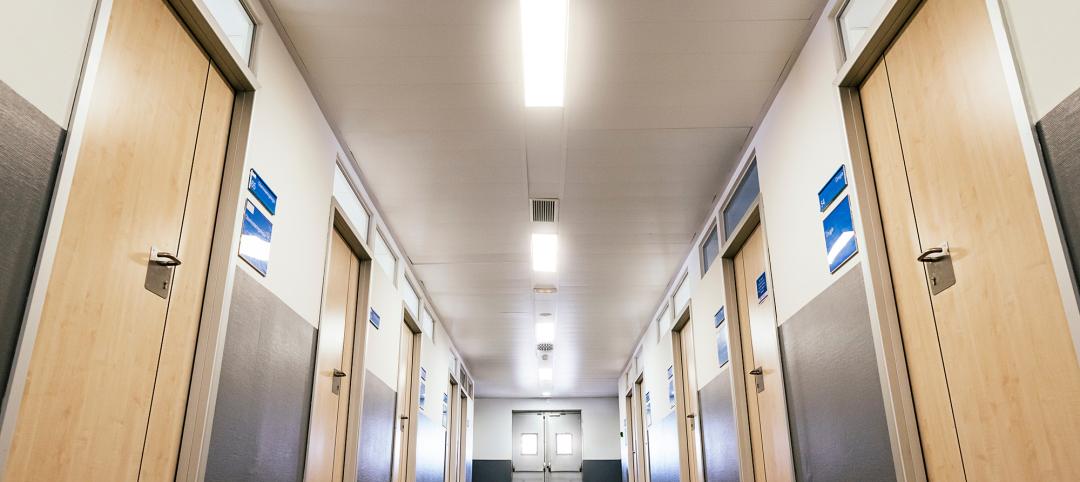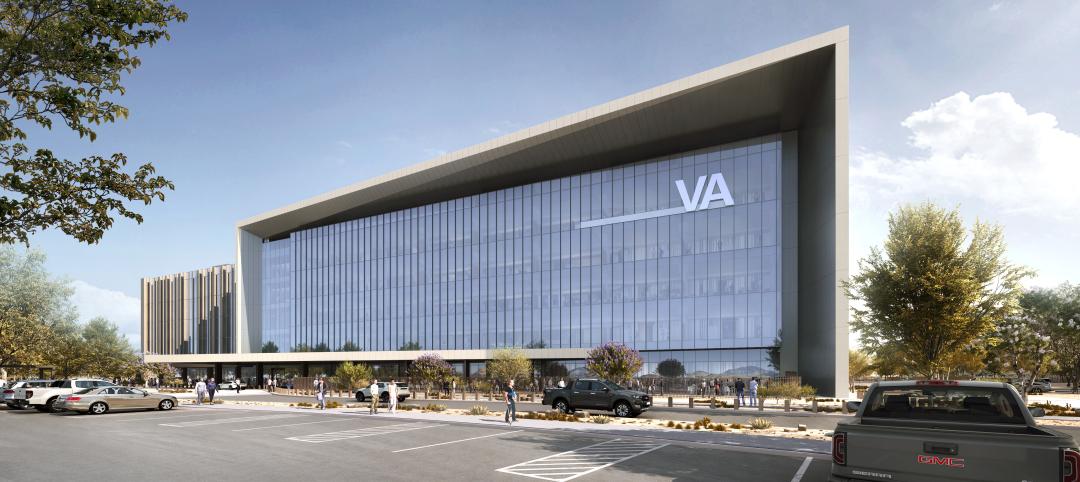The notion of open learning environments in higher education is trending, leading to the design of more collegiate buildings worldwide that are meant to remove barriers between students, faculty and disciplines.
Arizona State University’s Health Futures Center riffs on this popular design and educational idea, aiming to be a connecting place for interdisciplinary innovation, research, and medical simulation. Ground recently was broken on the facility, which is located adjacent to the Mayo Clinic campus, in northeast Phoenix.
The $80 million health care services facility will have a flexible framework, meant to support research and collaboration between the Mayo Clinic and ASU. The 142,000 SF building project’s groundbreaking was in April 2019; it is expected to be completed by late 2020. It is the first building on a new campus for ASU.
The building is meant to bring together the university’s College of Nursing and Health Innovation, College of Health Solutions, and the Ira A. Fulton Schools of Engineering, together with some shared programs of the Mayo Clinic.
The project was designed by CO Architects and DFDG Architects. CO Architects has expertise in developing such “hybrid” learning environments as is planned for the ASU facility.

“Our goal with ASU’s Health Futures Center is to create opportunities that maximize interdisciplinary collaboration and research in partnership with Mayo Clinic Phoenix, to help meet the mission of improving health outcomes,” says Jennifer Knudsen, AIA, LEED AP BD+C, Principal at CO Architects. “Our team designed the building to support a range of evolving interdepartmental research activities, industry partnerships, and teaching models through flexible, innovation-ready spaces.”
The under-construction building’s planned trapezoid façade is meant to decrease glaring from sun exposure on the structure’s east and west sides.
See Also: Sail on, Royal Caribbean: HOK-designed headquarters celebrates cruise ship industry
To speed work on the aggressively scheduled project, the CO/DFDG team collaborated with DPR Constriction’s pre-construction team, by way of the construction Manager at Risk method. The collaboration spawned a predictive cost-analysis tool, helping the project’s stakeholders prioritize needs and wants before the schematic design phase. This approach enabled the teams to design a building that fit needs and desires, and which will be within budget.
Through using Dassault Systemes’ 3DEXPERIENCE platform, the project’s designers streamlined and simplified the visual representation of the building’s complex geometry, enabling stakeholders to understand the structure’s design benefits.
CO Architects is the design architect, master planner, simulation planner, interior designer and laboratory planner for the building. DFDG is the project’s executive architect. DPR Construction is general contractor, ASE is serving as the structural engineer, Wood Patel is civil engineer, Jeremiah Associates, LLC, is performing AV/IT and acoustical, AEI Affiliated Engineers, Inc. is MEP engineer, and Floor Associates is performing landscape work on the project.
Related Stories
Healthcare Facilities | Oct 28, 2024
New surgical tower is largest addition to UNC Health campus in Chapel Hill
Construction on UNC Health’s North Carolina Surgical Hospital, the largest addition to the Chapel Hill campus since it was built in 1952, was recently completed. The seven-story, 375,000-sf structure houses 26 operating rooms, four of which are hybrid size to accommodate additional equipment and technology for newly developed procedures.
Healthcare Facilities | Oct 18, 2024
7 design lessons for future-proofing academic medical centers
HOK’s Paul Strohm and Scott Rawlings and Indiana University Health’s Jim Mladucky share strategies for planning and designing academic medical centers that remain impactful for generations to come.
Seismic Design | Oct 17, 2024
Calif. governor signs limited extension to hospital seismic retrofit mandate
Some California hospitals will have three additional years to comply with the state’s seismic retrofit mandate, after Gov. Gavin Newsom signed a bill extending the 2030 deadline.
Healthcare Facilities | Oct 9, 2024
How healthcare operations inform design
Amanda Fisher, Communications Specialist, shares how BWBR's personalized approach and specialized experience can make a meaningful impact to healthcare facilities.
Healthcare Facilities | Oct 8, 2024
Herzog & de Meuron completes Switzerland’s largest children’s hospital
The new University Children’s Hospital Zurich features 114 rooftop patient rooms designed like wooden cottages with their own roofs. The project also includes a research and teaching facility.
Hospital Design Trends | Sep 26, 2024
Hospital benchmarking survey shows sharp rise in hospital energy costs
Grumman|Butkus Associates, a firm of energy efficiency consultants and sustainable design engineers, recently released the results of its 2023 Hospital Energy and Water Benchmarking Survey, focusing on healthcare facilities’ resource usage trends and costs for calendar years 2021 and 2022.
Healthcare Facilities | Sep 19, 2024
New El Paso VA healthcare center includes 47 departments, brain and spinal cord injury treatment services
A new 492,000 sf Veterans Administration ambulatory care facility on the William Beaumont Army Medical Center campus near El Paso, Texas will include 47 medical departments and provide brain and spinal cord injury treatment services. A design-build team of Clark Construction, SmithGroup, and HKS is spearheading the project that recently broke ground with anticipated completion in 2028.
Healthcare Facilities | Sep 9, 2024
Exploring the cutting edge of neuroscience facility design
BWBR Communications Specialist Amanda Fisher shares the unique considerations and challenges of designing neuroscience facilities.
Curtain Wall | Aug 15, 2024
7 steps to investigating curtain wall leaks
It is common for significant curtain wall leakage to involve multiple variables. Therefore, a comprehensive multi-faceted investigation is required to determine the origin of leakage, according to building enclosure consultants Richard Aeck and John A. Rudisill with Rimkus.
Sponsored | Healthcare Facilities | Aug 8, 2024
U.S. healthcare building sector trends and innovations for 2024-2025
As new medicines, treatment regimens, and clinical protocols radically alter the medical world, facilities and building environments in which they take form are similarly evolving rapidly. Innovations and trends related to products, materials, assemblies, and building systems for the U.S. healthcare building sector have opened new avenues for better care delivery. Discussions with leading healthcare architecture, engineering, and construction (AEC) firms and owners-operators offer insights into some of the most promising directions. This course is worth 1.0 AIA/HSW learning unit.

















